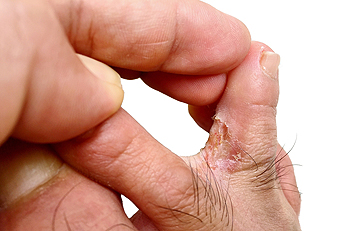 Foot blisters can be a difficult thing to prevent and can cause a lot of discomfort. Traditional methods and tools of prevention include multiple layers of socks, foot powder, and pads. While some have had success with these methods, there is still a risk for developing blisters. Recently, a study conducted by Grant Lipman, M.D. and Stanford University Medical Center found an effective prevention method. A simple application of paper tape can dramatically reduce the likelihood of developing blisters. Each applicant had tape applied to suspected hot spots on one foot while the other foot was left untaped. Out of the 128 runners who were tested in the 155 mile, multi-stage event, 98 of them developed no blisters on the taped foot. On the other hand, 81 developed blisters on untaped areas. For those who want to try taping for their next athletic or recreational activity, paper tape is very cheap with rolls costing only around a dollar on average.
Foot blisters can be a difficult thing to prevent and can cause a lot of discomfort. Traditional methods and tools of prevention include multiple layers of socks, foot powder, and pads. While some have had success with these methods, there is still a risk for developing blisters. Recently, a study conducted by Grant Lipman, M.D. and Stanford University Medical Center found an effective prevention method. A simple application of paper tape can dramatically reduce the likelihood of developing blisters. Each applicant had tape applied to suspected hot spots on one foot while the other foot was left untaped. Out of the 128 runners who were tested in the 155 mile, multi-stage event, 98 of them developed no blisters on the taped foot. On the other hand, 81 developed blisters on untaped areas. For those who want to try taping for their next athletic or recreational activity, paper tape is very cheap with rolls costing only around a dollar on average.
Blisters are prone to making everyday activities extremely uncomfortable. If your feet are hurting, contact one of our podiatrists of Sayville Foot Care. Our doctors can provide the care you need to keep you pain-free and on your feet.
Foot Blisters
Foot blisters develop as a result of constantly wearing tight or ill-fitting footwear. This happens due to the constant rubbing from the shoe, which can often lead to pain.
What Are Foot Blisters?
A foot blister is a small fluid-filled pocket that forms on the upper-most layer of the skin. Blisters are filled with clear fluid and can lead to blood drainage or pus if the area becomes infected.
How Do Blisters Form?
Blisters on the feet are often the result of constant friction of skin and material, usually by shoe rubbing. Walking in sandals, boots, or shoes that don’t fit properly for long periods of time can result in a blister. Having consistent foot moisture and humidity can easily lead to blister formation.
Prevention & Treatment
It is important to properly care for the affected area in order to prevent infection and ease the pain. Do not lance the blister and use a Band-Aid to provide pain relief. Also, be sure to keep your feet dry and wear proper fitting shoes. If you see blood or pus in a blister, seek assistance from a podiatrist.
If you have any questions, please feel free to contact our office located in Sayville, NY . We offer the newest diagnostic and treatment technologies for all your foot care needs.
